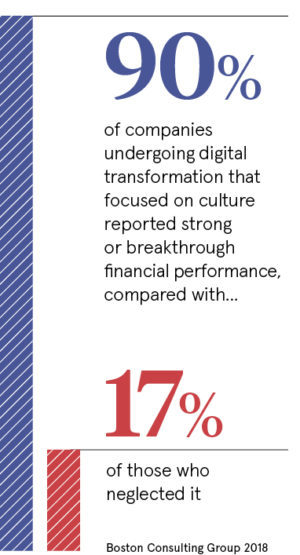From the very first days of the Industrial Revolution, British engineering and manufacturing industries were in the vanguard of change. These days, however, they may not always seem to be the earliest adopters. Data from management consultancy Russell Reynolds Associates shows that only 48 per cent of industrial manufacturing firms have a digital strategy, compared with 62 per cent of automotive firms and 56 per cent of companies in consumer products. “They seem to be a little bit behind some of the other sectors,” says consultant Catarina Abrantes.
But while engineering and manufacturing may not be leading the charge in terms of digital transformation, there’s a lot going on behind the scenes.
“Many manufacturers have been embracing digital technologies and techniques for years, through gradual evolution, and many are actively taking steps to determine the ways in which they can incorporate these steps,” says the manufacturers’ association Make UK.
Over 4 per cent of new manufacturing jobs will be in digital tech
Research carried out by Oxford Economics in 2016 revealed that revenue related to digital capacity in the manufacturing industry was growing at 3.2 per cent a year, putting it behind only tech services, retail and construction. Manufacturers told the researchers that they expected more than 4 per cent of new jobs to relate to digital technologies over the following two years.
“Robotics is such a promising area; it increases our speed, quality, and minimises errors,” according to the chief information officer of a mid-sized manufacturer based in Yorkshire and the Humber.
The key is communication, with the most successful transformations involving regular input from employees at all levels
However, there’s a great deal more to digital transformation than simply buying new kit. It also involves a complete overhaul of an organisation’s processes and creating a corporate culture to suit.
This, says the EFF, is harder for some engineering organisations than others. “Medium-sized companies have the highest instances of issues relating to a lack of culture in the business towards change and not understanding how the technologies can help their business,” the Make UK says.
Focussing on culture is the secret to digital transformation
 Last year Boston Consulting Group (BCG) assessed around 40 digital transformations and found that the proportion of companies reporting “breakthrough or strong financial performance” was five times greater – 90 per cent – among those focusing on culture.
Last year Boston Consulting Group (BCG) assessed around 40 digital transformations and found that the proportion of companies reporting “breakthrough or strong financial performance” was five times greater – 90 per cent – among those focusing on culture.
“A healthy culture provides the guidelines – the tacit code of conduct – that steer individuals to act appropriately and make choices which advance the organisation’s goals and strategy,” says BCG’s Jim Hemerling.
However, businesses need to be sure this culture permeates right the way through the organisation.
“I think there are some things that need to be top down as without the right leadership, nothing will change. But there also needs to be empowerment at the bottom,” says Mark Enzer, chief technical officer at Mott McDonald, who leads the digital transformation workstream within the Institution of Civil Engineers.
Manufacturing companies need employee buy-in to go digital
The key to this is likely to be communication and a focus on how a digital transformation mindset can improve the working practices of all employees.
“For businesses that have a top-down process in initiating projects, some may find there can be a lack of buy-in from employees, and those not at senior management or board level may feel left out of the process, or a lack of communication of these transformations means employees do not see the value of the changes,” the EFF warns.
“There are also many companies using these technologies that do so because of suggestions and initiatives of those on the shop floor, who often have first-hand knowledge of what can be streamlined, improved or adapted within the manufacturing process, as well as what products could help them to improve these aspects.”
The key, of course, is communication, with the most successful transformations involving regular input from employees at all levels of the organisation. According to Russell Reynolds consultant Sarah Galloway, this means paying special attention to middle management.
“As the senior management lead the change and the younger population are de facto ‘digital natives’, middle management needs the most help to trigger the change,” she says.
